Working with children in their earliest years is incredibly rewarding.
Approximately 90% of a child’s brain develops between the ages of 0 and 5 so a high-quality early education can be life-changing.
If you want to help make these first five years count, there are a number of ways to embark on a career in the early years sector. Find out everything you need to know about early years careers below.
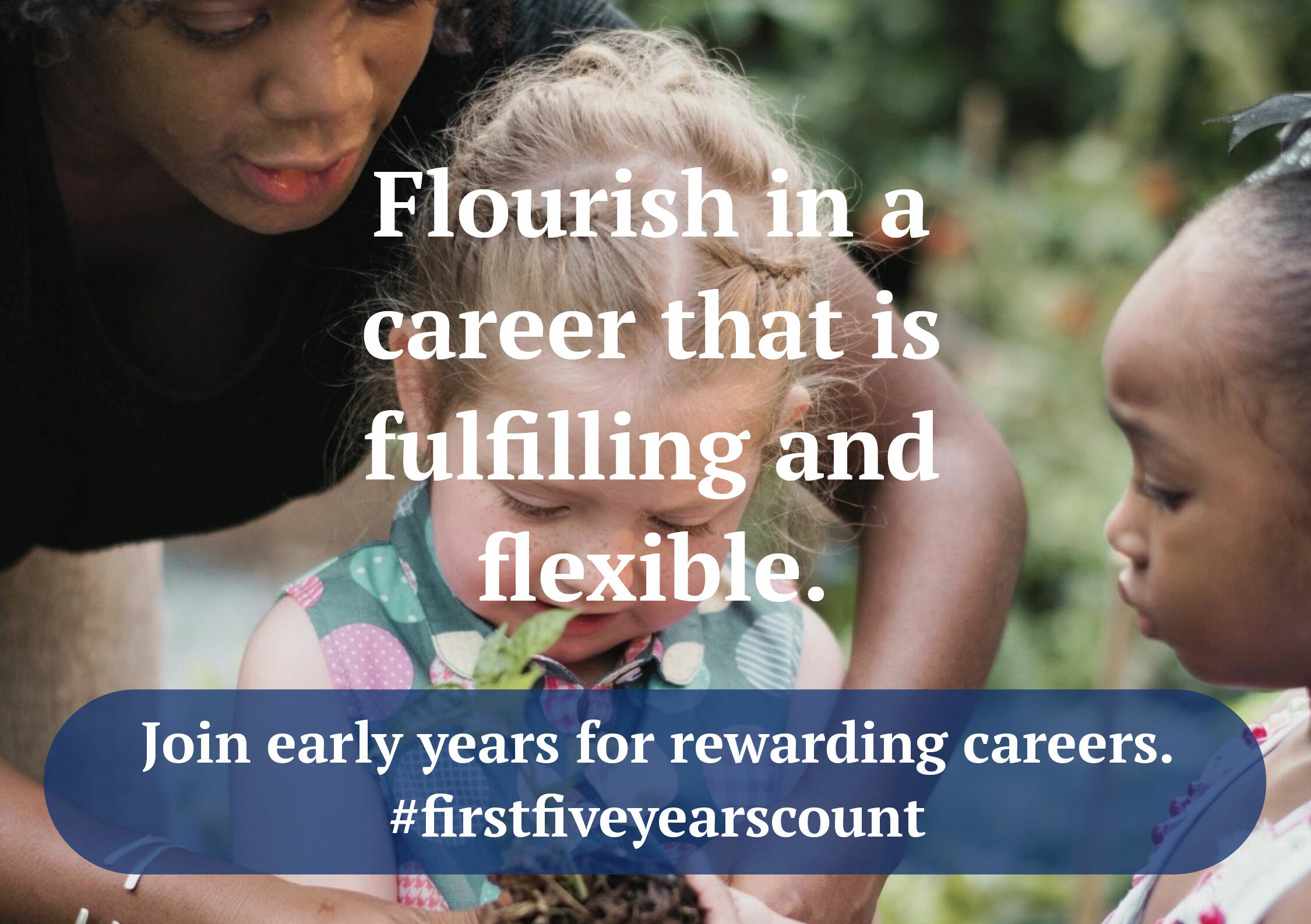
If you enjoyed this video, please share to help spread the word on the impact of the early years sector.
Where do I start?
If you want to help make these first five years count, there are a number of ways to embark on a career in the early years sector, including:
- Applying for a role directly (with or without a qualification)
- A college course
- An apprenticeship
- Working toward a school based or post 16 qualification
- Volunteering.
Whether you have a formal qualification in early years education and care or not, there are lots of opportunities for new entrants, whether you enter directly from formal education or through a career change from a different sector, perhaps later in life.
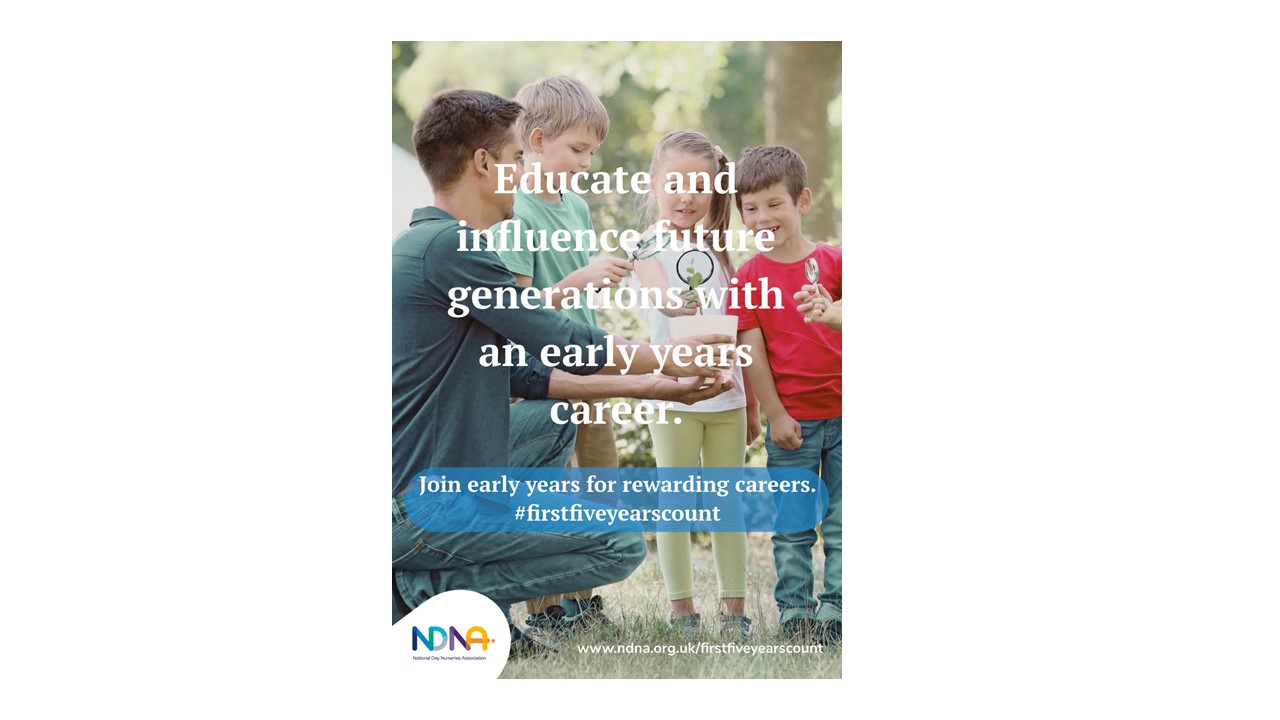
Where will my career in early years take me?
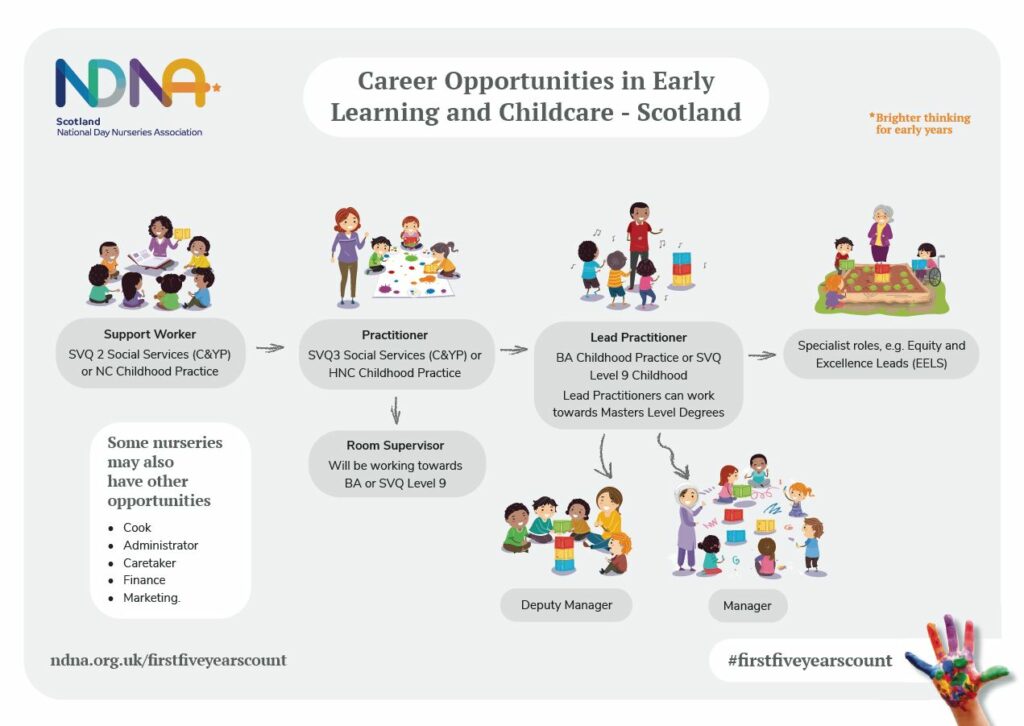
Routes to qualifications in Scotland
You can get a job in early learning and childcare without any formal, childcare related qualifications. However you will have to get qualifications while you work. In some instances you can get an Apprenticeship and ‘earn as you learn’, receiving a wage while you complete your qualifications. Alternatively you could enrol in a full-time college course which involves lots of time on placement in a nursery.
Qualifications will give you a grounded understanding of how children develop and how positive interventions with children during their first five years help them to become lifelong learners and positive citizens.
As you progress through qualifications at different levels you will be able to register with the Scottish Social Services Council as a support worker, practitioner and lead practitioner. You are required to register and complete relevant qualifications as you progress your career in childcare. To progress to each level you have to build on prior learning and registration demonstrates your professionalism and commitment to continuous professional learning.
Most Scottish full-time students will not have to pay tuition fees. You don’t have to apply for this as your eligibility will be considered automatically at enrolment. After the UK has left the EU, students from those territories may have to pay tuition fees. Should you find you do need to pay fees or need financial support you can access funding through the Student Awards Agency Scotland.
Many employers offer modern apprenticeships. A Modern Apprenticeship is a job which lets people earn a wage and gain an industry-recognised qualification. For employers, modern apprenticeships help develop their workforce by training new staff, and upskilling existing employees. There are also a number of graduate apprenticeship places offered through the University of Highlands and Islands.
Find out more about ELC careers in Scotland
In order to work in ELC you must register with the Scottish Social Services Council This is only something you can do once you have a job. Once you have a job you can register before you gain your qualification but you must be willing to work towards the registerable qualification to maintain registration and satisfy any registration requirements.
Early Learning and Childcare Careers – Scottish Government information on ELC careers.
Costs covered for the Protecting Vulnerable Groups (PVG) membership fee
The Scottish Government to cover the costs of the Protecting Vulnerable Groups (PVG) membership fees for new entrants to the sector for the remainder of the 2023-24 financial year.
Anyone starting a new role in childcare, including childminders, from 1 August 2023 – 31 March 2024 are eligible to have their membership of the PVG scheme paid by the Scottish Government.
To be eligible for this fee waiver, you must be working in a role that requires registration with the Scottish Social Services Council (SSSC) under the Day Care of Children category or register as a childminder or childminding assistant with the Care Inspectorate (CI).
More information on eligibility and how to apply for the fee waiver is available here.
Roles available to me in early years
These include roles such as cook, admin staff, finance and unique sector specific roles, such as quality improvement or curriculum lead.
We have listed typical roles that you would find in almost all nursery settings below, alongside the qualifications required for these types of jobs.
There is also a requirement in Scotland for you to be registered with the Scottish Social Services Council (SSSC) here. While there are many different job titles within the Early Learning and Childcare (ELC) sector in Scotland, all of these fit in with three specific categories according to the SSSC: support worker, practitioner and lead practitioner.
If you choose to volunteer in a nursery you are not required to register with the SSSC but you will not be counted in the official ratio for the setting and you will not have responsibility for individual or groups of children without a registered practitioner being with you.

Support Worker
 This is an entry level position and is a great way to get a start in early learning and childcare. As a Support Worker you will look after young children – playing, caring for them, and making sure they are learning and developing.
This is an entry level position and is a great way to get a start in early learning and childcare. As a Support Worker you will look after young children – playing, caring for them, and making sure they are learning and developing.
In this job role as a Support Worker, you are likely to:
- Work under supervision with experienced practitioners
- Support experienced practitioners to provide care routines and deliver educational play opportunities/activities that enable children to explore and develop
- Provide support to children based on their needs and interact children from a variety of backgrounds
- Observe how each child learns differently, with your support, and how experienced practitioners structure play activities to ensure that learning opportunities are maximised.
As a Support Worker, you will need shorter programmes of learning in areas such as Safeguarding, Food Hygiene, etc. Your employer may present the opportunity for you to take part in Paediatric First Aid training.
As part of your registration you are required to work towards a qualification. The qualifications for this role are:
- NC in Early Education and Childcare (SCQF Level 6)
- SVQ Social Services (Children and Young People) (SCQF Level 6)
- Foundation Apprenticeship Social Services (Children and Young People)
- (SCQF Level 6) usually completed in secondary school year 5 and year 6.
There are other Level 6 entry level qualifications which will be accepted by the SSSC and can be found here.
Practitioner
 It’s an Early Learning and Childcare Practitioner’s responsibility to identify and meet the care, support and learning needs the children they work with. As part of a team, you’ll make sure that the activities and games you provide are educational, fun and engaging. You could be tasked to look after a specific room or group of children.
It’s an Early Learning and Childcare Practitioner’s responsibility to identify and meet the care, support and learning needs the children they work with. As part of a team, you’ll make sure that the activities and games you provide are educational, fun and engaging. You could be tasked to look after a specific room or group of children.
As a Practitioner, in this job you are likely to:
- Understand how to work effectively with children
- Work with lead practitioners and others to meet the needs of individual children.
- Be involved in planning for children’s development and providing experiences that are child centred to support children to explore and develop
- Enable children to develop the skills to self-regulate their emotions and support them to build resilience in dealing with different situations that they are faced with every day
- Have responsibility for key children, observe, plan and assess children’s development and learning, engage with parents and carers and lead on some activities.
As part of your registration you are required to work towards a qualification. The qualifications for this role are:
- HNC in Childhood Practice (SCQF Level 7)
- SVQ Social Services (Children and Young People) (SCQF Level 7) (Part-time)
- SVQ or Modern Apprentice Social Services (Children and Young People)
There are other Level 7 entry level qualifications which will be accepted by the SSSC and can be found here.
Often practitioners are promoted to room supervisors and while still registered as a practitioner you should show a willingness to work towards a lead practitioner’s qualification.
Lead Practitioner
 As a Manager (or Lead Practitioner) or Deputy Manager you’ll be tasked with the development, management, and quality assurance of the childcare setting – including the supervision of staff and the management of resources. You will have responsibility for the setting’s development plan. This is where the lead practitioner will work on the long term and medium term plan for the nursery. This might also be called an improvement plan or a Standards and Quality Improvement Plan (SQIP). This can include plans for the children’s development and learning, staff development and setting improvements. It is usually required by the local authority as part of your partnership contract. You will also have overall responsibility for checking up on the progress and development of the children in your care.
As a Manager (or Lead Practitioner) or Deputy Manager you’ll be tasked with the development, management, and quality assurance of the childcare setting – including the supervision of staff and the management of resources. You will have responsibility for the setting’s development plan. This is where the lead practitioner will work on the long term and medium term plan for the nursery. This might also be called an improvement plan or a Standards and Quality Improvement Plan (SQIP). This can include plans for the children’s development and learning, staff development and setting improvements. It is usually required by the local authority as part of your partnership contract. You will also have overall responsibility for checking up on the progress and development of the children in your care.
Deputy Manager
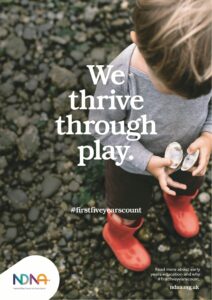 If you are the deputy manager you will be working towards gaining the Level 9/10 or Degree in Childhood Practice.
If you are the deputy manager you will be working towards gaining the Level 9/10 or Degree in Childhood Practice.
In this job role as a Deputy Manager, you are likely to:
- Supporting the Manager to provide inclusive experiences for all children attending the setting will be one of your main aims
- Maintaining a safe, stimulating and enjoyable environment
- Taking joint responsibility for curriculum planning within the setting
- Assisting the Manager with tasks such as maintaining staffing levels and monitoring financial performance in the Manager’s absence
- Supporting the Manager in ensuring the staff are committed to safeguarding and promoting the welfare of children and young people in the setting
- Acting as the safeguarding lead in the absence of the Manager, following the prescribed policy and procedures
- Overseeing the planning, delivery and monitoring of the Curriculum for Excellence in accordance with the children’s learning and developmental needs
- Supporting the Manager to ensure the setting is actively engaged in continuous quality improvement
- Managing other staff on a daily basis as directed by the Manager – including supervising volunteers, students and apprentices on work placement or work experience. You could act as a mentor ensuring new staff are aware of the operational policies and procedures including how to implement and access them.
Manager
 If you are the manager then you will either have gained the SVQ Level 9 Childhood Practice or BA in Childhood Practice. You are likely to have several years of experience as a deputy manager. It is important that you demonstrate a sound understanding of child development and children’s needs with an ability to plan and implement the curriculum in accordance with the Curriculum for Excellence. This is Scotland’s education curriculum from 3 to 18 years of age.
If you are the manager then you will either have gained the SVQ Level 9 Childhood Practice or BA in Childhood Practice. You are likely to have several years of experience as a deputy manager. It is important that you demonstrate a sound understanding of child development and children’s needs with an ability to plan and implement the curriculum in accordance with the Curriculum for Excellence. This is Scotland’s education curriculum from 3 to 18 years of age.
You must be committed and lead the staff team to safeguard and promote the welfare of children and young people. It is your responsibility to ensure all staff share this commitment and follow the prescribed policy and procedures to promote a culture of safeguarding continuously within your setting.
In this job role as a Manager you are likely to:
- Setting a clear and ambitious vision for the setting for providing high-quality, inclusive early learning and childcare to all. This is realised through strong shared values, policies and practice
- Taking the lead responsibility for the implementation of the setting’s agreed business plan for the management of people, resources and all paperwork and record keeping meets the required standard including recording progress and achievement
- Liaising with a range of visiting specialists, such as speech and language therapists
- Having a working knowledge of Getting it Right for Every Child (GIRFEC) and your role in supporting children and families with Additional Support Needs (ASN)
- Developing partnerships with parents, carers and guardians signposting appropriately to meet the needs of the family
- Leading the provision of early learning and childcare to agreed quality standards, reflecting the requirements of the;
- Curriculum for Excellence which is the education curriculum from 3 years to 18 years;
- Realising the Ambition: Being Me! Which is the national practice guidance for early years in Scotland
- Quality Framework for ELC settings – Care Inspectorate
- How Good is our Early Learning and Childcare? – Self-Evaluation framework for education – Education Scotland
- Child protection legislation, e.g. keeping children safe in education
- The Childcare (Scotland) Act
- Equality Act;
- Children and Young People (Scotland) Act
- UNCRC (Incorporation) (Scotland) Bill
- Health & Safety regulations and all other relevant legislation.
- Taking the lead in inspections
- Managing staff on a day-day basis and carry out appraisals and target setting with your staff
- Ensure that you and practitioners receive focused and highly effective professional development.
Managers in more senior positions may also have responsibilities for a number of early learning and childcare sites across the group. Managers at this level will have a clear vision and strategy and hold senior leaders to account for the quality of care and education. They ensure that resources are managed sustainably, effectively and efficiently.
As part of your registration you are required to work towards a qualification. The qualifications for this role are:
- BA Hons Childhood Practice (4 year course)
- BA Childhood Practice (3 year course)
- Graduate Diploma Childhood Practice (1 year course)
- SQA Professional Development Award Childhood Practice (1 year course)
- PgDip in Childhood Practice (1 year course)
- MEd Childhood Practice – usually completed once you’re working at Manager/Lead Practitioner level (1 year course)
- Graduate Apprenticeships are now available for Early Learning and Childcare.
There are other Level 9/10 qualifications which will be accepted by the SSSC and can be found here.
Equity and Excellence Lead Role
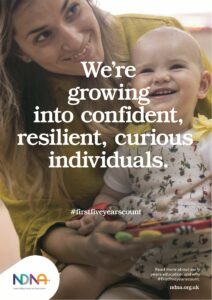 There is also a more specialised role which is registered under the Lead Practitioner role. The role of Equity and Excellence lead is primarily focused on leading support for the most disadvantaged children (for example through poverty) to close the poverty related attainment gap (the gap in learning and development between children who are disadvantaged and those who are not). This role provides the setting with an additional graduate role who is often not counted in staff to child ratios and you are likely to have several years of experience as a lead practitioner.
There is also a more specialised role which is registered under the Lead Practitioner role. The role of Equity and Excellence lead is primarily focused on leading support for the most disadvantaged children (for example through poverty) to close the poverty related attainment gap (the gap in learning and development between children who are disadvantaged and those who are not). This role provides the setting with an additional graduate role who is often not counted in staff to child ratios and you are likely to have several years of experience as a lead practitioner.
This role involves working directly with children and does not focus on managerial responsibilities, e.g. administration and payroll.
Another key task of the Equity and Excellence Lead is to lead and support pedagogy (methods used in working with the children) in a setting, upskilling fellow practitioners.
Equity and Excellence Leads (EELs) are counted within to the settings’ adult-child ratios like other staff and therefore have greater flexibility and reflection time to lead and support pedagogy. Local authorities have been given freedom to utilise leads depending on their local needs and the leads experience, therefore the roles focus may differ across settings.
As part of your registration for this role you are required to work towards a qualification. The qualifications for this role are:
- BA Hons Childhood Practice (4 year course)
- BA Childhood Practice (3 year course)
- Bachelor of Education (4 Year course)
- Graduate Diploma Childhood Practice (1 year course)
- SQA Professional Development Award Childhood Practice (1 year course)
- PgDip in Childhood Practice (1 year course)
- MEd Childhood Practice – usually completed once you’re working at Manager/Lead Practitioner level (1 year course)
- Graduate Apprenticeships are now available for Early Learning and Childcare
There are other Level 9 qualifications which will be accepted by the SSSC and can be found here.
Nursery Teacher
 Often a nursery will employ a teacher to support the development and planning of the curriculum. This will be done alongside the Lead Practitioner. The Nursery Teacher does not need to register with the SSSC however they are required to register with the General Teaching Council Scotland.
Often a nursery will employ a teacher to support the development and planning of the curriculum. This will be done alongside the Lead Practitioner. The Nursery Teacher does not need to register with the SSSC however they are required to register with the General Teaching Council Scotland.
In this job role as a Nursery Teacher, you would lead and support early learning and childcare by:
- Working directly with children to role model effective teaching and learning, actively supporting curriculum development and innovation, using a blended approach to early learning within the framework of Curriculum for Excellence
- Engaging with the learning environment, staff teams, families and the community, to support children’s early learning and development
- Encouraging children and staff to be active participants in learning
- Facilitating effective observation and reporting on children’s early learning
- Enabling and supporting professional development, dialogue and discourse within the nursery setting
- Supporting establishment in self-evaluation and quality assurance process
- Promoting and supporting continuity and progression from nursery to primary school
- Engaging in continuous professional development and training.
You would need a degree in Primary Education (SCQF level 9/10) or a Professional Graduate Diploma in Education – Primary (PGDE) (SCQF level 11).


